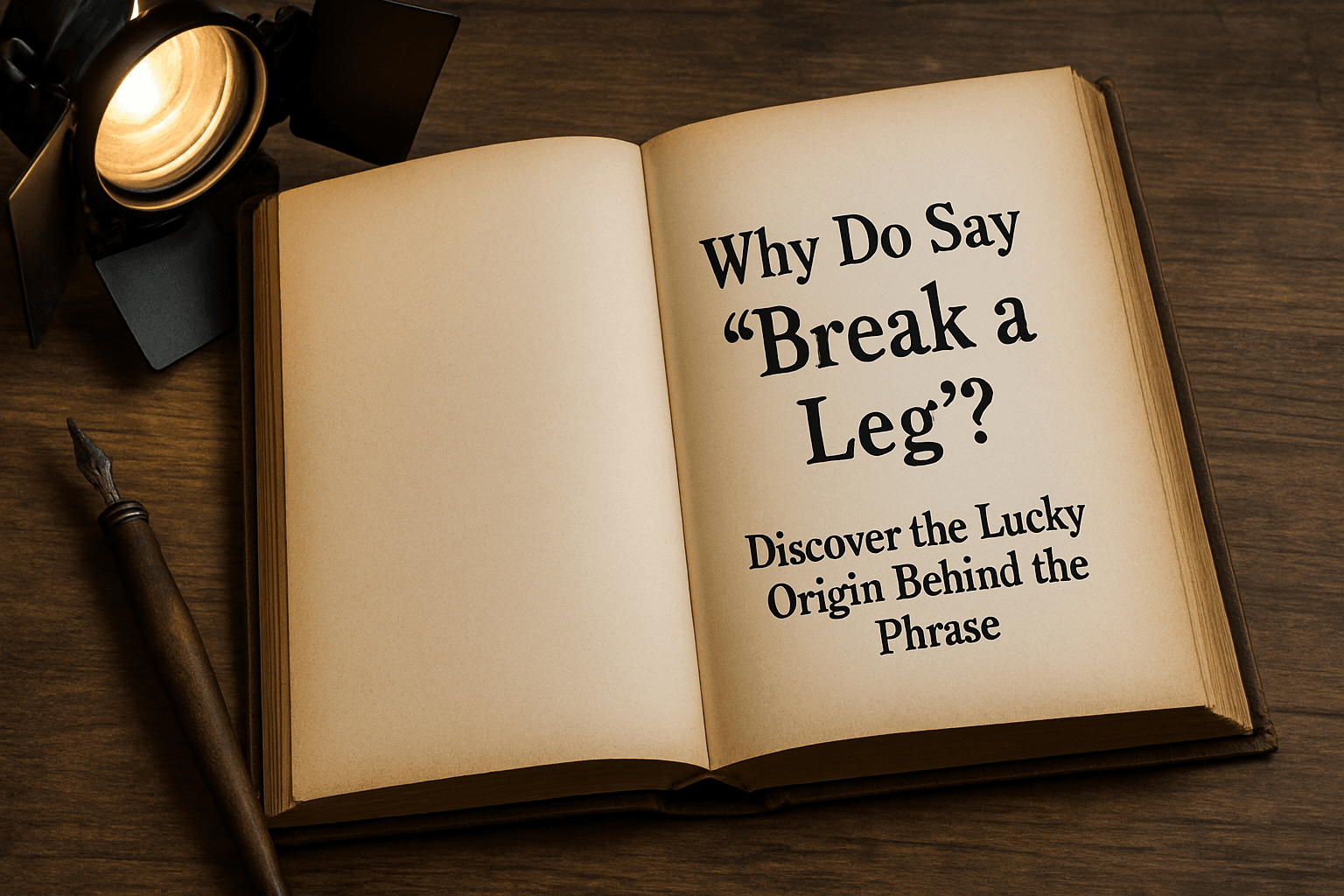Theater culture is full of colorful traditions and superstitions, but perhaps none is more iconic—or puzzling—than the phrase “break a leg.” While it may sound aggressive or even harmful to the uninitiated, it’s actually one of the most heartfelt wishes of good luck in the world of performance arts.
But why do we say “break a leg”? And where did this strange expression come from? Let’s dive into the history, meaning, and cultural impact of this peculiar phrase, and explore how it fits within the world of English idioms and common idioms.
The Surprising Meaning Behind “Break a Leg”
At face value, telling someone to “break a leg” might seem like a hostile act. Yet, among actors and performers, it’s quite the opposite—it’s a way to wish someone good luck without actually saying the words “good luck.”
Why avoid such a seemingly innocent phrase? It comes down to superstition. Many performers believe that directly wishing someone good luck can actually bring bad luck. So, over time, they adopted a reverse psychology approach—wishing something bad in order to ensure something good happens.
Thus, “break a leg” came to be understood as a coded way of expressing support and encouragement.
The Origin of “Break a Leg”: Where It All Began
When it comes to the break a leg origin, there isn’t a single, universally agreed-upon explanation. Instead, the phrase is surrounded by various theories and legends. Here are some of the most well-known:
1. The Theater Curtain Theory
In traditional theaters, the “leg” referred to a vertical side curtain that framed the stage. Breaking a leg could mean passing beyond the curtain—in other words, actually getting on stage to perform. In this context, being told to “break a leg” was a way of saying “I hope you get on stage and shine.”
2. The Elizabethan Influence
Another theory links the phrase back to Elizabethan England, where it’s believed that audience members would stomp or bang their legs in applause. So if an actor received such a strong reaction that someone might “break a leg,” it meant they had given a stellar performance.
3. The Understudy Theory
In older theater culture, understudies would only get a chance to perform if something happened to the main actor—like an injury. In a tongue-in-cheek way, saying “break a leg” to a fellow actor might have been an ironic way of wishing for an opportunity to perform.
4. Influence from Other Languages
Some linguists believe that the phrase could have been translated or adapted from German theater traditions, where the phrase “Hals- und Beinbruch” (literally “neck and leg break”) was used to wish good luck. That German phrase might have made its way into English usage over time.
How the Phrase Spread Beyond the Stage
While “break a leg” originated in the theater world, it has since spilled over into everyday language, particularly in artistic or performance-related contexts like:
- Before a big job interview
- Before a school presentation
- Before going on live television
- Even before a sports game
Although it’s most closely tied to actors and performers, you might hear someone say it in any situation where a little luck and courage are needed.
The Power of Superstition in the Arts
Why do artists and performers cling so tightly to superstition? The answer lies in the unpredictability of live performance. Even with preparation, anything can happen in front of an audience. Superstitions—like saying “break a leg”—provide a sense of control, comfort, and tradition.
Actors often have elaborate pre-show rituals, and phrases like “break a leg” become part of that psychological preparation. It’s less about the literal meaning and more about belonging to a shared culture.
“Break a Leg” Among Other Common Idioms
“Break a leg” is just one of many common idioms in English that don’t make literal sense but carry cultural weight. Some similar idioms include:
- “Kick the bucket” – to die
- “Let the cat out of the bag” – to reveal a secret
- “Spill the beans” – to give away information
- “Piece of cake” – something very easy
- “Hit the sack” – to go to bed
Like “break a leg,” these idioms enrich the English language by giving it flair, personality, and tradition.
Teaching Idioms: How “Break a Leg” Helps ESL Learners
For those learning English, idioms like “break a leg” can be confusing at first. But they also offer an exciting opportunity to connect with culture. Teachers often use phrases like these to:
- Expand vocabulary
- Improve listening comprehension
- Teach figurative vs. literal language
- Explore cultural context
Understanding idioms is a big step toward fluency, and “break a leg” is one of the most fun to explore.
Final Thoughts: A Phrase of Encouragement, Not Injury
So, the next time someone tells you to “break a leg,” don’t take it personally—they’re actually wishing you success, luck, and maybe even a standing ovation.
While the break a leg meaning may sound strange, it’s deeply rooted in tradition, history, and culture. The origin of “break a leg” might never be fully confirmed, but its significance is unquestionable. It’s a phrase that has stood the test of time, becoming a beloved part of English idioms and theater lore.
So go ahead—embrace the superstition, step into the spotlight, and break a leg!




